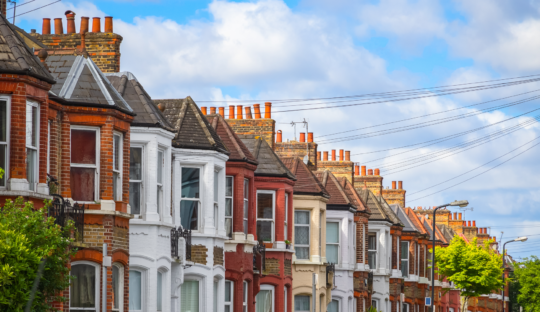In this article
A chain-free property refers to a home being sold without the complications of a property chain. In a typical property chain, each buyer and seller relies on the completion of other transactions to proceed.
For instance, when someone buys a house, they often need to sell their current one first to fund the new purchase, and the same situation may apply to the seller.
This creates a sequence of dependent sales that can delay or disrupt the process if one party hits an issue.
When a property is advertised as chain-free, it simply means that the seller does not need to wait for any other transaction to complete.
Property Chains
Explained in 1 min 5 seconds
Find more videos like this on MoneymanTV
Reasons a Property May Be Chain-Free
There are several common reasons why a property might be sold chain-free:
New Build Homes
New build properties are typically sold directly by developers and come without a seller who needs to move out. This means there is no onward chain to worry about.
Buyers can move into these homes as soon as contracts are exchanged and the build is complete, making the process much quicker.
Developers also tend to offer incentives like part-exchange deals or help with deposit fees, which can further simplify the transaction.
These are often sold directly by developers and don’t involve anyone moving out.
Vacant Properties
Properties that have already been vacated, perhaps because the previous owner has moved into rented accommodation or already purchased another home, are considered chain-free.
Since the property is empty, there’s no need for the seller to coordinate moving out, which can speed up the completion process and reduce complications.
Inherited Properties
When a home is inherited, the beneficiaries are often not living in the property, meaning they can sell it without needing to buy another home in return.
This makes inherited homes a common source of chain-free properties, particularly if the inheritors are looking to sell quickly to divide the estate or simply don’t need the property.
Buy to Let Mortgages
Landlords selling buy to let investment properties that are no longer required also offer chain-free homes.
They usually have no emotional attachment to the property and may want a swift sale to reinvest elsewhere.
This can be an ideal opportunity for buyers looking to avoid delays, especially if the property is vacant or the tenants are moving out.
Benefits of Buying a Chain-Free Property
One of the key advantages of a chain-free property is the speed and simplicity of the transaction.
Since there are fewer parties involved, there’s less risk of delays, and the process tends to move more quickly.
This makes them particularly appealing for first time buyers, those needing to relocate swiftly, or those who have already sold their own property and need to move on quickly.
Another benefit is that chain-free sales generally involve fewer opportunities for issues to arise, such as a buyer pulling out last minute or a property survey revealing unexpected complications in another sale within the chain. This can help minimise stress during what is often an anxious process.
Drawbacks to Consider
Although chain-free properties tend to be simpler, it’s important to remember that no property purchase is entirely without potential challenges.
Surveys might still uncover problems, and the legal process can still take time.
Chain-free properties can also be more in demand, which may lead to competition and possibly higher offers, particularly in a hot market.
For buyers looking to reduce the complexity of their move and shorten the timeline, a chain-free property can be an ideal option, especially if time is of the essence or you are keen to avoid the frustrations often associated with property chains.
Chain-free properties are often highlighted in estate agent listings, so if you’re keen on avoiding delays and additional stress, it’s a good idea to prioritise these types of homes in your property search.







